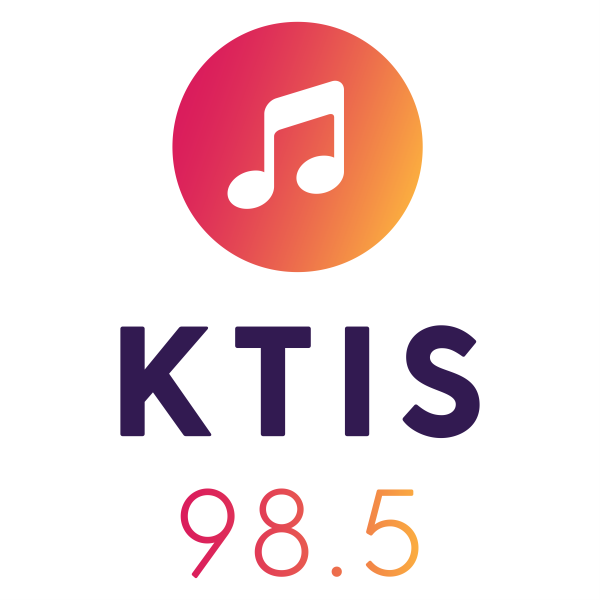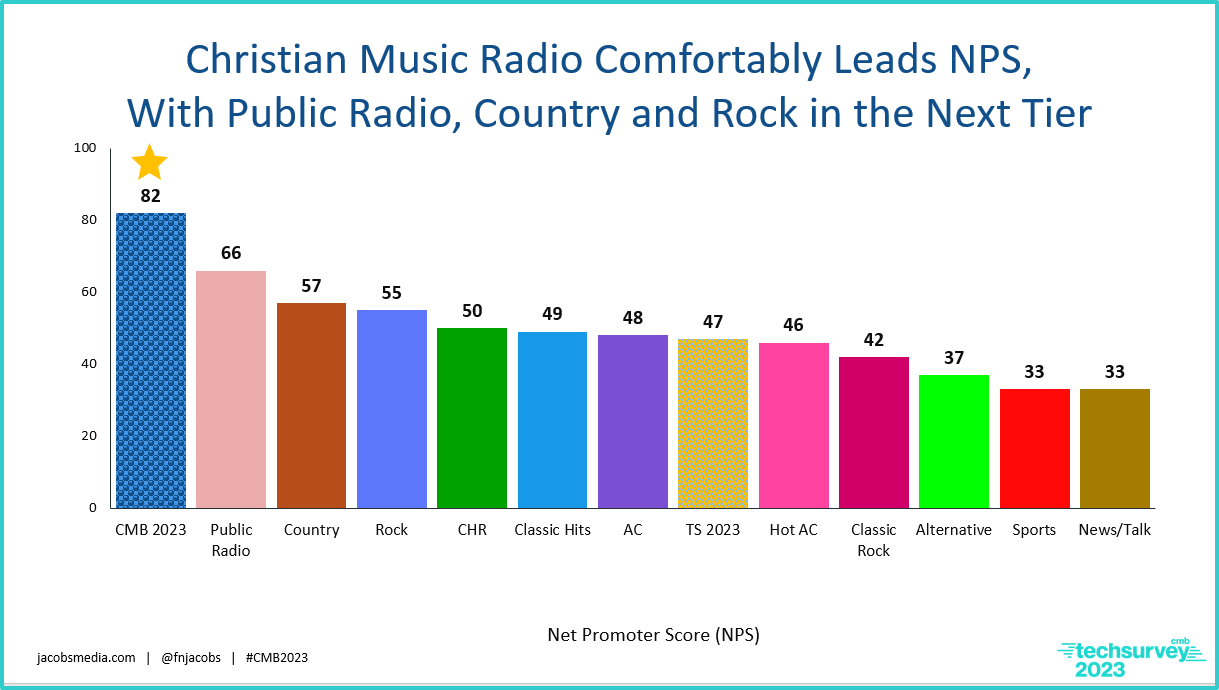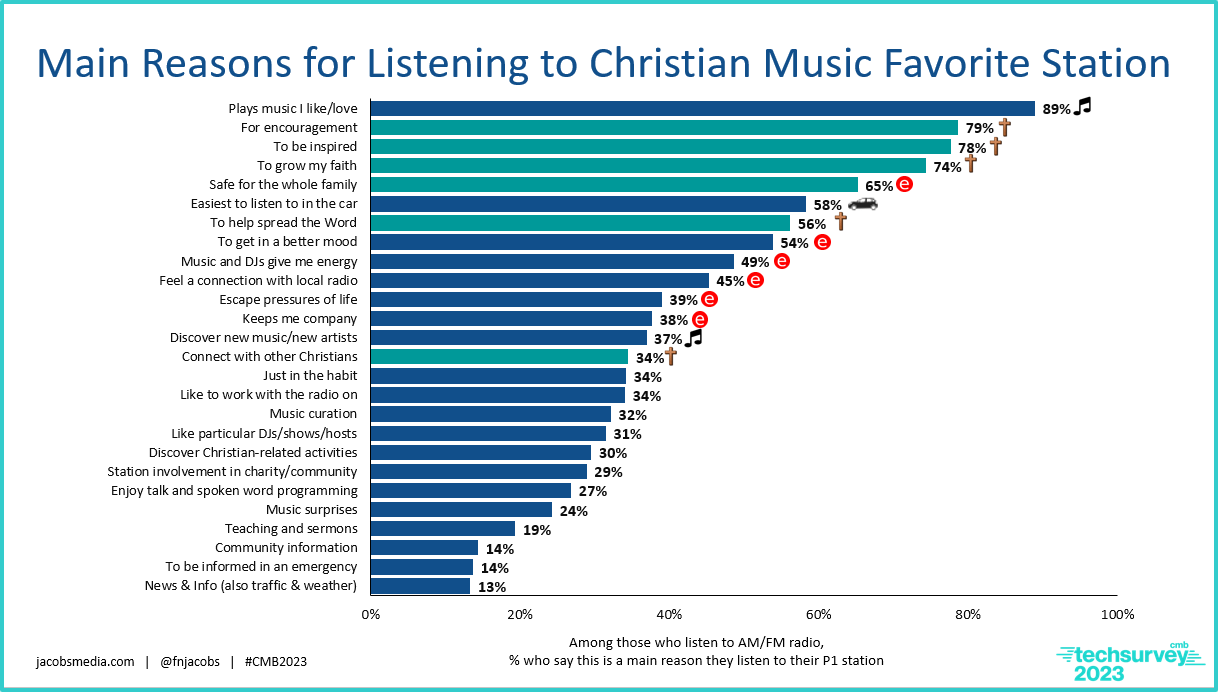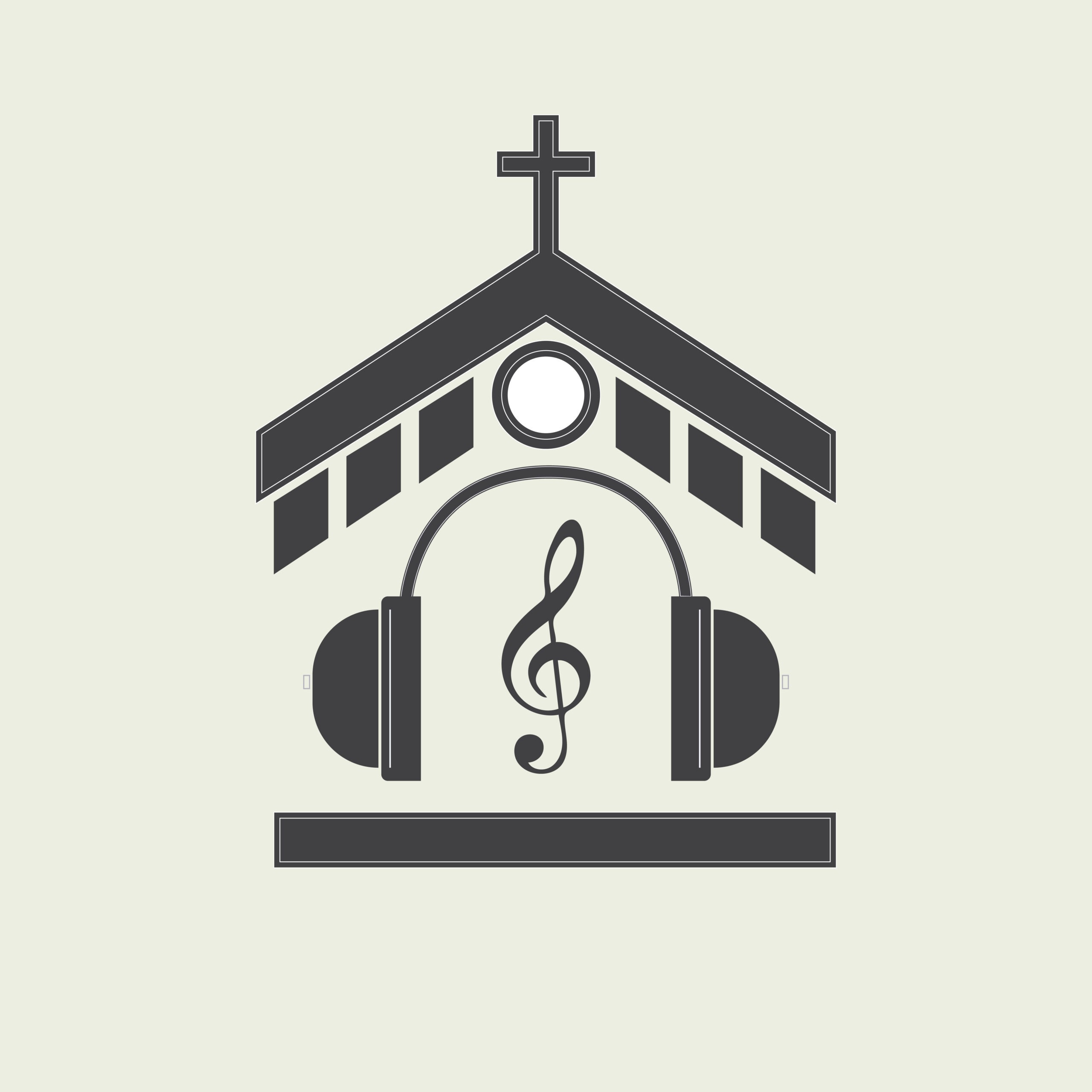
Trends in the radio business can be so fleeting. For example, take formats. Ask most people which ones are on a roll this year, and you’re likely to hear all about Country and Classic Hits. And that’s understandable as they are each showing growth.
But bubbling under most radar screens is a format that most acknowledge, but few understand. How do I know this? First, we’ve been tracking the music end of the format for a decade in our Christian Music Broadcasters annual Techsurveys, in collaboration with Michelle Younkman’s CMB organization.
Second, those ratings are undeniable. As Michael Foust wrote last month in Christian Headlines, faith-based in stations in markets such as Minneapolis/St. Paul, Tampa/St. Pete, and Houston are all showing up top 5 in 6+ Nielsen ratings.
KTIS in the Twin Cities (better get used to those call letters) sits in the #1 perch in the market. It’s owned by a Christian college, the University of Northwestern in Roseville. 
And finally, many of the radio sales we’ve been reading about in the past few years have involved Christian organizations – always as the buyers. Remember Entercom sold KSWD/Los Angeles to the Educational Media Foundation (EMF/K-LOVE, Air 1) back in 2017. Then in 2019, Cumulus sold six stations to EMF – in D.C. (WRQX), New York (WPLJ), along with stations in Atlanta, San Jose, Savannah, and Syracuse.
Earlier this year, EMF bought KTHT in Houston from Urban One. And Cumulus sold WDRQ (Detroit) to Family Life Radio back in June.
These purchases go on. While most commercial radio companies aren’t in acquisition mode, Christian organizations see major growth in broadcast radio.
And why not? They are doing excessively well in any number of KPIs. At Jacobs Media, we see the results in our CMB Techsurvey. A sneak preview of this year’s survey reveals that Christian Music Radio outflanks the all-important Net Promoter Scores for both public radio and commercial radio. And it’s not even close:

That lofty NPS mark of 82 for Christian music stations ties its all-time high set in 2021. So how can we explain that incredible feelings of loyalty these listeners have for their favorite stations?
A look at our “Why Christian Radio?” hierarchy tells the tale:

Yes, they like these stations for their music and their ease of access in the car – just like we see for commercial radio.
But Christian stations are mission-based. Their foundations of faith and inspiration pop near the top of this list of main drivers for listening. Being “safe for the whole family” isn’t just a nice idea – it’s an imperative. All those teal bars speak volumes about what sets these stations apart.
Note that many of the motivations for listening are similar to what we see in public radio. For NPR-type stations, our “Why Radio?” chart is loaded with core values that include values like objectivity, trust, and civility. Christian radio is also mission-based, but exhibits more singularity of focus.
 Interestingly, both Christian and public radio share structural similarities with each other. For the most part, they are both commercial-free, only airing underwriting messages. Each also relies on donations from their respective flocks during pledge drive-like campaigns (often called Share-a-thons in Christian radio).
Interestingly, both Christian and public radio share structural similarities with each other. For the most part, they are both commercial-free, only airing underwriting messages. Each also relies on donations from their respective flocks during pledge drive-like campaigns (often called Share-a-thons in Christian radio).
But of all the broadcast radio platforms, Christian radio may be the most scalable. For many broadcasters in the space, they rely largely on network level programming with minimal local programming. This keeps staffing low, even in big markets like L.A. or New York.
They have their own conferences, their own gatherings, and their own communities. The lives many Christian broadcasters personally lead parallels their career paths. They take their radio and its mission very seriously.
It really boils down to this:
Ask a Christian broadcaster what their station stands for, and they’ll tell you succinctly without batting an eye. Ask a commercial radio programmer the same question and you’re liable to get a meandering, rambling answer.
At a time in radio where many are questioning everything – about creating content, sales marketing, and ratings success – Christian broadcasters are mostly basking in the glow of success. They see the path forward, and their relationship with their audience is strong. Like all broadcasters, they are grappling with digital investment and transformation. But comfortable with their missions, and knowing that as American lives become more complicated and pressurized, their roles become integral in helping their audience make it through the gauntlet.
forward, and their relationship with their audience is strong. Like all broadcasters, they are grappling with digital investment and transformation. But comfortable with their missions, and knowing that as American lives become more complicated and pressurized, their roles become integral in helping their audience make it through the gauntlet.
If you haven’t done so already, a deeper look at your market’s ratings may be in order, especially if you routinely skip over these stations. And it might be smart to actually spend some time listening to them. It will help you better understand their success, and it might even give you a good idea or two.
If anyone gets it, Dan Seeman does. He’s Hubbard’s VP/regional manager in the company’s home market. He’s watched the KTIS ascension:
“It’s very well done, it’s good radio, produced quite well. They’re got resources, marketing, a feeder system for talent and producers at the university.”
 Disruption is a fact of life in the media business, and no one knows this quite like radio broadcasters who have watched their world change radically in just the past few years. While most of the turbulence has come from the outside – streamers, social media, podcasting – the phenomenon known as Christian radio has been with us for eons. But changing sensibilities and conditions have created some incredible opportunities for these broadcasters.
Disruption is a fact of life in the media business, and no one knows this quite like radio broadcasters who have watched their world change radically in just the past few years. While most of the turbulence has come from the outside – streamers, social media, podcasting – the phenomenon known as Christian radio has been with us for eons. But changing sensibilities and conditions have created some incredible opportunities for these broadcasters.
As more and more people turn inward, concerned about their homes and families, Christian radio is providing more than just information or entertainment. Its faith-based programming content, its teachings, and its inspirational programming is filling an important need.
And larger audiences are showing their satisfaction and loyalty.
- What To Do If Your Radio Station Goes Through A Midlife Crisis - April 25, 2025
- A 2020 Lesson?It Could All Be Gone In A Flash - April 24, 2025
- How AI Can Give Radio Personalities More…PERSONALITY - April 23, 2025




No surprise. Just scan through most any area’s radio “dial.” There is no motivation for any human funding resource that can compete with “Dollars for Jesus.” Everyone wants to make their particular team #1. That funding source doesn’t seem to be as vulnerable to downward economic trends as commercial advertising, NCE station donations, etc. Average public radio listeners are not without passion, but it doesn’t seem to compare with that of evangelicals.
No doubt, the “passionometer” is off the charts in Christian.
My dad would have been so happy to read this news. He was a minister his whole life. For as long as I can remember, he listened to the local Christian radio station – WFME/Newark NJ, then when we moved to PA, WPGM/Danville. He listened to WPGM hours a day and supported it for almost 50 years. His love of listening to the radio is no doubt what got me listening a lot as a kid, dx’ing AM stations at night. I liked it so much it became my career.
Great story, Mark. Thanks for sharing it.
Mixed feelings about this one today, but oddly timed: I was holding down mid-mornings at Salem’s WAVA-FM in DC on Sept 11 when the Pentagon got hit down the road from us.
Whatever Christian syndi programs (Focus on the Family, Medved et al) were on the log, off they went to provide wall to wall news coverage from SRN, AP and local reports.
The GM came on the air for a few moments of introspection and prayer to an anxious audience trying to figure it all out.
Format be blasted. In the end this was the Christian thing to do.
In times of crisis and need, you indeed should do the right thing. Sounds like the GM had his finger on the pulse.
Hey Fred
Thank you for this article. I have been watching this Trend in Christian Music Radio for some time now, which inspired me to use my over 30 years of Radio Broadcasting experience to develop a similar faith-base “Rhythmic Gospel” radio format but targeting the 18-34 Black female demo. Long story short, I’ve been casting a net hoping that one of the many Media organizations would see some value in it, but no bite. After reading this article, I felt led to throw out my net again on the right side of the boat (John 21:6), and see if there is a haul this time. Listen here:
https://rdo.to/IKJZ
Nice job, VonRoy! Listening right now–and have tuned in before. Really well done. There’s certainly no shortage in variety of high-quality Christian music media. I wish you well and pray your net would “burst” on that right side!
Thank you, VonRoy.
I’d be interested in learning more about their audience composition. Are there Christiaan stations targeted to Millennials and Gen Z? If so, how do they do with their targets? If they perform well, maybe that’s some sort of signal that if you put something on the radio that isn’t available elsewhere, even 20-30-somethings might listen.
There are plenty of such subchannels/formats–plus even a few primary ones. If anything, though, the trend has been more to having them go online-only.
Among the examples that I can think of quickly…
Hope Media Group still has both NGEN Radio and Way Loud–which originally came from Hope Media’s two predecessor companies (with NGEN incorporating the former Way Now).
Radio Training Network has LF Radio as a subsidiary brand of The Joy FM–plus The Z as a subsidiary brand of His Radio.
Gateway Creative Broadcasting has the Boost format–which now has some ties with EMF. (Ironically, it somewhat fills the hole that EMF created when it overhauled Air1.)
CSN International may still have Effect Radio as a secondary format.
Finally, an independent station that has some significant coverage elsewhere is RadioU, based out of WUFM.
One more for now (which I vaguely remembered but had to confirm first) is northwest Ohio’s Yes FM simulcast.
Also, I forgot earlier that central Florida’s Z Ministries (WPOZ et al.) runs such secondary formats as The Rock (possibly just on HD now) and Hot (likely on both HD and at least one translator).
I’ll let the Christian PDs respond, Bob. But yes, I think they’re making progress.
Hey Bob, generally speaking, a lot of Christian radio stations are targeting mostly Millennials and some Gen X (Northwestern Media/K-LOVE/WAY-FM/etc). It’s my understanding that we tend to pull a lot of parents (Millennials and older) pretty well. Gen Z hasn’t necessarily grown into the style of music yet, but they stick around somewhat when their parents are listening. When Gen Z listens to radio, I think they appreciate many of the Christian stations that Eric has listed.
More than who we’re targeting though, I think it’s about the mission. Fred made a fantastic point when he talked about Christian radio stations being able to tell you easily what their mission/vision is. Listeners can tell the difference. They know when you’re authentic and they know when you sound like you have a plan. If you know where you’re going and they’re on board with that direction, I think you’ve got a loyal listener.
Well, you knew I just had to jump in on this one. Other than a couple stints in both country music radio where I started and at a local pop music station, I spent most of my career in Christian radio, including developing and hosting a Christian pop/rock show, which was the only such show in San Diego for most of its run. I knew little of what a “Christian music show” should sound like when asked to start it, so I just did the kind of fun, engaging, listener-interactive radio I grew up on, so you can imagine what a Christian music show with its major influences being the Bible, the Beatles, Mad Magazine and stations like KCBQ and KHJ might have sounded like. (And later David Letterman, who I often got comparisons to). And this was just when Amy Grant and others were starting–so the quality and popularity of the music was just taking off at the same time. I hung around radio stations enough and won enough prizes to know what works. And the response proved it. I had shows where the phone lines never stopped and emceed standing-room only shows at large venues. And a particularly fun memory, one night my boss happened to stop in with a new kitten she had just gotten, but which didn’t yet have a name. I tossed together some prizes and invited listeners to call in for our “Name the Cat” contest. I’d never seen such response before or since. Not only was every listener line lit up, every BUSINESS line was lit up–people were calling the main office number…AND…people were actually pulling over and coming up to the station to see the cat and enter the contest! (We had a big sign on our second-floor suite overlooking the street.) I remember my boss’s huge eyes, overwhelmed and so impressed with the response! (Thanks, listeners–always nice to look good in front of the boss!)
With such success, I reached out to a man who ran several stations south-of-the-border targeting the U.S. to see about putting the format full-time on one. We became instant friends, with him having me to two of his homes regularly. I played some clips of music and he asked, “Why isn’t my 13-year-old daughter listening to this?” He all but promised me a station to run the format on…and then just as suddenly became “unavailable” when I’d call. I can only guess someone or someones whose lives and livelihoods were on the line talked him out of it. Too bad. I think we could have done some really great things. Sorry it didn’t work out for both of us and our community then–but THRILLED to see it happening now. So to my Christian radio brothers and sisters, I say to you, keep making listeners lives better now–and for eternity.
Just a quick closing, a few years ago I came across a bag with some old cassettes of the show recorded off the air. Never had time to get them really organized so I just threw some random clips together, which can be heard here. Most of it is self-explanatory but one thing you wouldn’t know outside of San Diego, the phone number I give at one point to complain about the show was another station’s number–a very popular station whose phone number was their dial position, so most listeners knew it was a joke number. Also, that is the legend himself, Shotgun Tom Kelly, who leads off the clip. And that really is Archie Bunker explaining Creationism vs. Evolution at the 4:12 mark. And finally, I’ll leave it a surprise but the guy who does a liner at 11:40 is exactly who he says he is. He was at the station for an interview and graciously did this fun liner. Oh, and immediately after that is the famous “CD skipping live on the air” moment that I’ve mentioned here before. Hope you enjoy it. I sure did.
https://drive.google.com/file/d/1ZYb8EMTJMtq15h4bYvpwrqJn4_HVAp24/view?usp=sharing
Thanks for the contribution and perspective here, Dave. And yes, I thought you’d weigh in on this one.
Did you get a chance to listen to any of it, Fred? If not, can I ask you to just check out the opening from Shotgun, the clip of Archie Bunker at 4:12, the “surprise guest” at 11:40 and the “skipping CD” immediately after? Those four together are less than a minute total. I think you’ll really enjoy them. Thanks!
I went to school in Minneapolis nearly 30 years ago and KTIS was marketing like crazy even then. Regardless of their spiritual viewpoint, they just do good radio. Seems simple, doesn’t it?
I didn’t listen to Northwestern’s station in Madison (WNWC) when I was growing up, but did know about them. Northwestern has been a strong operator for decades; IIRC, it offered a satellite-based format (likely music-focused) to other broadcasters for some time.
Exactly, Brian.
But they’re not local. And they’re not interested in being local. They provide no LOCAL community service whatsoever, and they ask for no community input – until it’s time to ask for money.
There are plenty of local Christian stations. We typically serve the community more than secular stations. There are tons of local, non-EMF Christian stations across the map. I have been fortunate to work at 2 of the top stations in format—WAFJ Augusta (non-comm) and presently KXOJ Tulsa (commercial). If I can help provide any insight to you or your students in the format, please lemme know! I am a late 80’s WVCP alumni 🙂
Both WGTS (D.C.) and WRBS (Baltimore) do quite well–even after EMF’s moves around here over the past several years. In fact, the two still have a good amount of signal overlap.
https://www.youtube.com/watch?v=vzSBJwlfhg0
Awesome. Thanks for sharing, Bob.